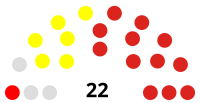
Elections to Angus Council were held on 3 May 2012 the same day as the other Scottish local government elections. The election used the eight wards, created as a result of the Local Governance (Scotland) Act 2004, with each ward electing three or four councillors using the single transferable vote system form of proportional representation, with 29 Councillors being elected.

Elections to Dundee City Council were held on 3 May 2012 on the same day as the other Scottish local government elections. The election used the eight wards created as a result of the Local Governance (Scotland) Act 2004, with each ward electing three or four Councillors using the single transferable vote system form of proportional representation, with 29 Councillors elected.

Elections to Aberdeenshire Council were held on 3 May 2012, on the same day as the other Scottish local government elections. The election used the 19 wards created as a result of the Local Governance (Scotland) Act 2004, with each ward electing three or four Councillors using the single transferable vote system form of proportional representation, with 68 Councillors being elected.
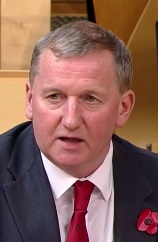
Elections to Fife Council were held on 3 May 2012, the same day as the other Scottish local government elections. The election used the 23 wards created as a result of the Local Governance (Scotland) Act 2004, with each ward electing three or four Councillors using the single transferable vote system form of proportional representation, with 78 Councillors elected.
Elections to Clackmannanshire Council were held on 3 May 2012, the same day as the 31 other local authorities in Scotland. The election used the five wards created under the Local Governance (Scotland) Act 2004, with 18 Councillors being elected. Each ward elected either 3 or 4 members, using the STV electoral system.
Elections to Inverclyde Council were held on 3 May 2012, the same day as the other 31 local authorities in Scotland. The election used the six wards created as a result of the Local Governance (Scotland) Act 2004, with each ward electing three or four Councillors using the single transferable vote system form of proportional representation, with 20 Councillors being elected in total.
Elections to Falkirk Council were held on 3 May 2012, the same day as the 31 other local authorities in Scotland. The election used the nine wards created under the Local Governance (Scotland) Act 2004, with 32 councillors being elected. Each ward elected either 3 or 4 members, using the STV electoral system.
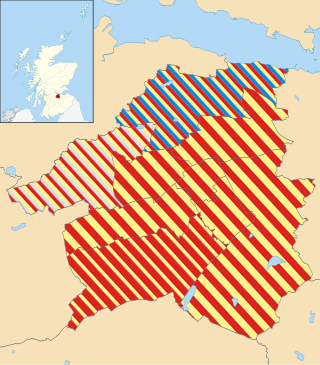
The 2012 West Lothian Council election took place on 3 May 2012 to elect members of West Lothian Council. The election used the 9 wards created as a result of the Local Governance (Scotland) Act 2004, with each ward electing three or four Councillors using the single transferable vote system form of proportional representation, with 33 Councillors being elected. The Bathgate Ward gained an additional seat for the 2012 elections. The election saw Labour remain the largest party on the Council as they gained 2 seats. The Scottish National Party (SNP) also made 2 net gains and significantly increased their vote share, outpolling Labour in terms of votes cast. The Conservatives retained their single seat on the Council and so to did the Independents. The Action to Save St. John's Hospital group were completely wiped out from the authority losing all of their 3 seats.

The 2012 Midlothian Council election took place on 3 May 2012 to elect members of Midlothian Council. The election used the six wards created as a result of the Local Governance (Scotland) Act 2004, with each ward electing three or four Councillors using the single transferable vote system form of proportional representation, with 18 Councillors being elected.

2012 Elections to East Lothian Council were held on 3 May 2012, on the same day as the other Scottish local government elections. The election used the 7 wards created as a result of the Local Governance (Scotland) Act 2004, with each ward electing three or four councillors using the single transferable vote system form of proportional representation, with 23 councillors elected.
Elections to North Lanarkshire Council were held on 3 May 2012 on the same day as the 31 other local authorities in Scotland. The election used the twenty wards created under the Local Governance (Scotland) Act 2004, with 70 Councillors being elected. Each ward elected either 3 or 4 members, using the STV electoral system.
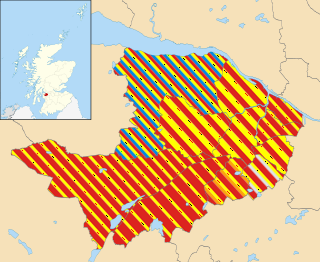
The 2012 Renfrewshire Council election took place on 3 May 2012 to elect members of Renfrewshire Council. The election used the eleven wards created as a result of the Local Governance (Scotland) Act 2004, with each ward electing three or four Councillors using the single transferable vote system form of proportional representation, with 40 Councillors being elected.
Elections to East Dunbartonshire Council were held on 3 May 2012, the same day as the 31 other local authorities in Scotland. The election used the eight wards created under the Local Governance (Scotland) Act 2004, with 24 Councillors being elected. Each ward elected 3 members, using the STV electoral system.
The 2017 West Dunbartonshire Council election was held on 4 May 2017, on the same day as the 31 other local authorities in Scotland. The election used the six wards created under the Local Governance (Scotland) Act 2004, with 22 Councillors being elected. Each ward will elect either 3 or 4 members, using the STV electoral system.

Elections to Dundee City Council were held on 4 May 2017 on the same day as the other Scottish local government elections. The election used the eight wards created as a result of the Local Governance (Scotland) Act 2004, with each ward electing three or four Councillors using the single transferable vote system. A total of 29 Councillors were elected.
The 2017 elections to Inverclyde Council were held on 4 May 2017, on the same day as the 31 other local authorities in Scotland. It was the third successive Local Council election to run under the STV Electoral System. The election used seven wards created under the Local Governance (Scotland) Act 2004, with 22 Councillors being elected, an increase of 2 from 2012 and an additional ward. Each ward elected either 3 or 4 members, using the STV electoral system.
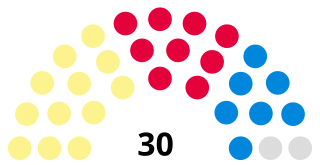
The 2022 elections to Falkirk Council were held on 5 May 2022 on the same day as the 31 other Scottish local government elections. The election used the nine wards created following the Local Government Boundary Commission for Scotland's 5th Review, with 30 councillors being elected. Each ward elected either three or four members, using the STV electoral system.

The 2022 Renfrewshire Council elections took place on 5 May 2022, as part of the 2022 Scottish local elections on the same day as the 31 other Scottish local authorities were up for election. The election used the 12 wards created under the Local Governance (Scotland) Act 2004 and last changed as a result of the 2015-16 Boundary Commission review, with 43 councillors being elected. Each ward elected either 3 or 4 members, using the STV electoral system.
The 2022 West Dunbartonshire Council election was held on 5 May 2022, on the same day as the 31 other local authorities in Scotland. The election used the six wards created under the Local Governance (Scotland) Act 2004, with 22 councillors being elected. Each ward elected either 3 or 4 members, using the STV electoral system - a form of proportional representation.

2022 Elections to Stirling Council were held on 5 May 2022, the same day as the 31 other local authorities in Scotland. The election used the seven wards created under the Local Governance (Scotland) Act 2004, with 23 councillors being elected. Each ward elected either 3 or 4 members, using the STV electoral system.
